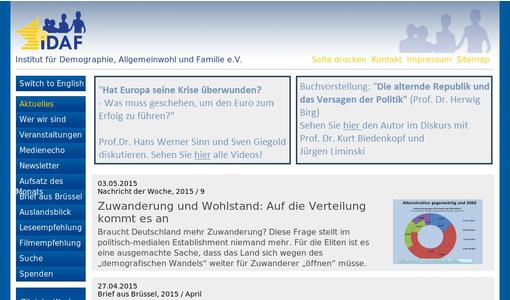First of all: Most of the members of national parliaments, such as the German Bundestag for example, quite naturally publish their religious affiliation or non-affiliation on their profile pages. In doing so they - at least statistically - allow for a "spiritual x-ray" of their parliament. In Strasbourg, however, the mere question of religious affiliation makes EU Members of Parliament frown: "How dare you ask such a question?". Today, religious confessions are taboo in EU institutions anyway. Just remember the passionate discussion on the reference to God in the EU Charta. Officially, the religious tendency of the political representatives remains unknown. So it actually boils down to the old biblical wisdom: You will know them by their fruits.
These "fruits" are still rare but nonetheless distinctive. Here is a basket with a small selection: First fruit: At the beginning of the legislative session, the group of European Christian Democrats in the EU Parliament appointed two female politicians from France and Sweden as representatives of the Committee on Women's Rights. The Committee is important for the agenda of the Christian Democrats as it is here that decision templates regarding "gender equality", gender ideology, quota regulation, the establishment of same-sex partnerships as well as a so-called "human right for abortion" are developed regularly. Many Members of Parliament object to this, not least because public protest provoking such decisions always imply considerable work. But instead of shaping the work of the Committee on Women's Rights or even advocating its dissolution, the European People's Party appoints two EPP-politicians whose declared intention it is to support the feminist positions of the Liberals and Social Democrats by usual consensus. Thus, the Christian and family-oriented wing of the EPP largely loses ground while the EPP adapts to the demands of the Committee on Women's Rights.
Second fruit: The "Week for Life", which is well-known in Germany, used to be organised jointly by factions of the EPP (Christian Democrats) and the ECR (European Conservatives and Reformists) and used to be supported on a cross-party basis by members of the Liberals and Social Democrats alike. This year, on request of EPP Group Chairman Manfred Weber (CSU), it was organised single-handedly; with the result that the "Week for Life" in the EU Parliament in spring 2015 was limited to a dull afternoon event without any external impact.
Third fruit: The intergroup "family" has finally been set up. However, this was preceded by continuous political scheming ever since the EU election. Long-standing chairperson Anna Zaborska was to be chased from the chair because she publicly advocated marriage as a union between a man and a woman. Many "family politicians" consider this viewpoint old-fashioned and interfering with political consensus.
Fourth fruit: The official dialogue between the EU institutions and the churches or religious communities leads to a progressive trivialisation of the Christian churches by the EU. According to Article 17 of the EU functioning contract all accepted churches or religious communities of a member state need to be heard by the EU institutions. On the one hand, this leads to the situation that the Apostolic Nuncio sits idly by and watch while the Secretary General of the Commission of the (Catholic) Bishop's Conferences of the European Community (COMECE) is allowed to speak. It is quite remarkable that a diplomatic envoy of the Holy See in the rank of archbishop has to pass on his speaking right to a lobbyist in the rank of priest. On the other hand, this consultation policy of all churches and religious communities in practice has the effect that the Roman-Catholic representative only has exactly three minutes speaking time just like any other representative of mostly unkown - and in fact politically unimportant - religious communities. This spring, at the behest of the President of the European Parliament, Martin Schulz, the "dialogue with the churches and religious communities" took place as an "inter-religious dialogue" on the subject of "religious radicalism and fundamentalism". The wording "inter-religious" however suggests that the dialogue takes place only between the churches and religious communities while the EU Parliament merely provides the infrastructure. But this contradicts the functioning contract of the EU. Also the formulation of the topic suggests that all religions (also the Jewish and Christian religions) can be compared to Islamic terror, although the focus was on the current threat of terrorism emanating from political Islamism in the 28 member states. Besides, the Security Service of the EU institutions in Brussels considers the threat of terrorism an immanent danger so that a scheduled exchange of views with representatives of the persecuted Christians of Iraq was cancelled at short notice due to security reasons.
The topic of the persecution of Christians has been in the news for the last couple of months. Nevertheless, in his draft of the annual report to the High Representative of the Union for Foreign Affairs and Security Policy the rapporteur, Elmar Brok (Christian Democrat), omitted any reference to the fact that the ever increasing and brutalising persecution of Christians in the world needs to be addressed at the highest European decision-making level. An appropriate paragraph was only added during the final vote of the Plenary Assembly by means of an oral amendment put forward by conservative members not belonging to the EPP.
On Wednesday, 29th April, the Plenary Assembly in Strasbourg held a general debate on the tragedies in the Mediterranean as well as the immigration and asylum policies of the EU. Also on the agenda was a discussion on the killing of Christian students in Kenya by the terrorist group al-Schabab. Such debates can hardly be an indicator for a "spiritual x-ray". They namely end in purely non-legislative, non-binding resolutions. From a political perspective, these fruits are worth as much as windfall.

